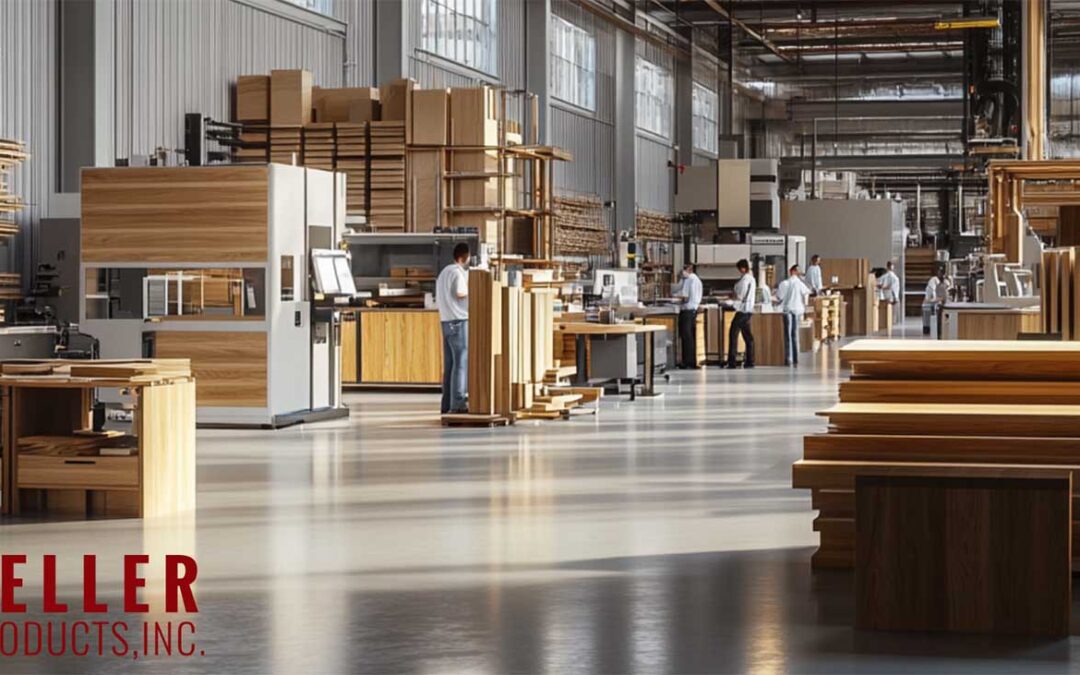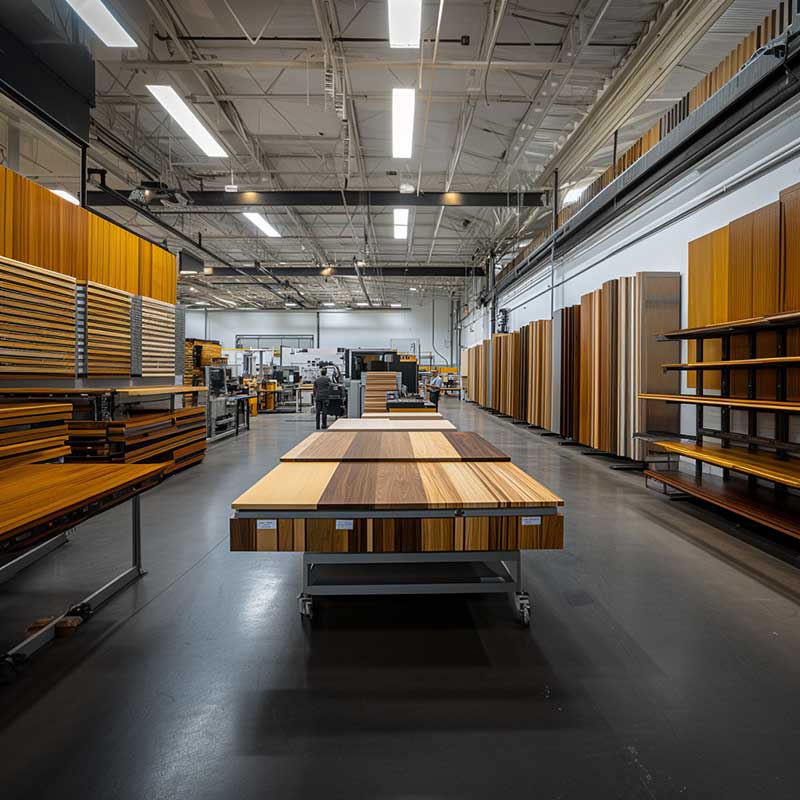Selecting the right wood product supplier is crucial for any woodworking, construction, or furniture manufacturing business. The quality of your wood products can directly impact your reputation, customer satisfaction, and bottom line. But with so many wood product manufacturing companies out there, finding one that meets your specific needs can feel overwhelming. How can you ensure you’re partnering with a reliable supplier offering high-quality materials, reasonable pricing, and timely delivery? In this guide, we’ll explore key factors to consider when choosing a wood product supplier so you can make an informed decision and find the right fit for your business.
Why is it Important to Choose the Right Wood Product Supplier?
A reliable supplier ensures consistent quality, helping you maintain high standards across every project. Conversely, poor-quality materials or unreliable deliveries can disrupt workflows, increase costs, and damage customer trust.
The right supplier contributes to operational efficiency by meeting production schedules, providing flexible order sizes, and offering expert guidance for specialized needs. Additionally, partnering with a supplier that aligns with your sustainability goals can enhance your company’s brand image, meeting the growing demand for eco-friendly practices.
Choosing wisely safeguards your bottom line and builds a long-term relationship that supports your business growth and innovation. With this in mind, the following guide will help you identify the key factors to consider when selecting a wood product supplier that meets your needs.
How Much Lumber Do You Need?
Understanding your lumber requirements is essential in choosing the right supplier. Consider the volume, type, and grade of wood needed for your projects. Suppliers often specialize in different wood types and may have varying capacities to handle bulk orders. Whether you need small quantities for bespoke furniture pieces or large volumes for industrial-scale construction, ensure your supplier can meet your demand without compromising quality.
Establishing Minimum and Maximum Order Quantities
Understanding a wood product supplier’s minimum and maximum order quantities is crucial when choosing one. This is particularly important for businesses with varying production demands, seasonal shifts, or plans to scale operations.
- Determine Minimum Order Quantities (MOQs): The minimum order quantity is the smallest volume of wood the supplier is willing to sell. If your business requires limited quantities for specialized projects, ensure the supplier’s MOQs align with your purchasing needs. Suppliers with high MOQs may not be suitable if you need smaller, more frequent orders.
- Identify Maximum Order Quantities: Maximum order quantity refers to the largest volume the supplier can handle without affecting lead times or quality. If you have high production needs or plan to expand, choose a supplier that can consistently fulfill large orders and has the necessary resources, inventory, and production capacity to support your growth.
- Flexibility in Order Quantities: Suppliers who offer flexibility in order quantities can cater to businesses with fluctuating demands, whether due to seasonal changes or varying project requirements. This flexibility ensures you’re not locked into rigid contracts, allowing you to adjust order sizes as needed to keep your production workflow efficient and responsive.
Clearly defining and communicating your order quantity expectations with potential suppliers helps establish a relationship that supports your current and future production needs. A supplier with adaptable order capacities is better equipped to handle changes in demand, making your business more agile and competitive.
Matching Supplier Capabilities to Project Requirements
Not all suppliers can accommodate specialized project needs, making it essential to evaluate whether a supplier has the necessary experience, equipment, and technical expertise. This is particularly relevant for custom or complex wood components that require precise manufacturing processes.
- Assess Experience with Specific Product Types: Determine if the supplier has a proven track record in delivering the types of wood products your project requires. For example, if you need wooden furniture components, ensure the supplier has the capabilities and experience to produce these components to your specifications.
- Evaluate Advanced Manufacturing Capabilities: Specialty wood products often involve intricate processes, such as heat bending, precision cutting, or advanced lamination. Confirm that the supplier has the necessary machinery, technology, and skilled workforce to meet your project’s technical demands and quality standards.
- Confirm Capacity for Custom Orders: If your project involves custom wood shapes, sizes, or finishes, ask the supplier about their ability to create bespoke solutions. Suppliers with experience in custom manufacturing have the flexibility to produce wood products tailored specifically to your unique design and functional requirements.
Matching supplier capabilities to your project’s needs minimizes the risk of production issues, quality inconsistencies, and delays. It also ensures that your chosen supplier can support your business as it evolves, accommodating more complex or higher-volume orders as needed.
Evaluating Supplier Credentials
Evaluating a wood supplier’s credentials involves more than just checking their business history. Research customer reviews, verify certifications, and understand their reputation in the industry. A reputable supplier should have a strong track record of delivering high-quality products and maintaining strong relationships with clients.
Checking Customer Reviews and References
Customer reviews and references are invaluable resources when evaluating a wood product supplier’s reliability and overall service quality. They offer a firsthand perspective on what it’s like to do business with the supplier, highlighting both strengths and potential weaknesses. To effectively utilize reviews and references in your decision-making process, focus on the following areas:
- Consistency in Positive Feedback: Look for reviews that consistently mention the supplier’s ability to meet deadlines, maintain product quality, and respond to customer inquiries. Frequent mentions of these qualities indicate that the supplier is dependable and can be trusted to deliver on their promises. Reviews that highlight good communication, flexibility in order sizes, and problem-solving capabilities are strong indicators of a reliable partner.
- Insights on Specific Project Types: Seek out reviews relevant to your specific project or industry. For example, if you require custom wood shapes or specialty products like laminated wood panels, find reviews from customers who ordered similar items. This will provide insight into the supplier’s expertise in handling complex requirements and delivering high-quality, specialized wood products.
- Reaching Out to References: Request a list of references from the supplier and reach out to these clients directly. When speaking to references, ask detailed questions about their experience with the supplier’s delivery times, product quality, and how the supplier managed unexpected issues. Inquire about the supplier’s willingness to go above and beyond to meet project specifications and their adaptability in handling changes to order sizes or timelines.
Leveraging customer reviews and references helps you better understand how the supplier performs in real-world situations. This approach reveals the supplier’s strengths and uncovers any recurring issues that could impact your project. A supplier with a strong track record of satisfied customers is more likely to be a reliable and trustworthy partner for your business.
Verifying Industry Certifications and Compliance
When selecting a wood product supplier, industry certifications and compliance with local and international standards are critical. These credentials indicate that the supplier adheres to the best sourcing, manufacturing, and environmental responsibility practices. By choosing a certified supplier, you ensure that your materials are ethically sourced, of high quality, and meet regulatory standards.
- Relevant Industry Certifications: Look for certifications such as the Forest Stewardship Council (FSC) or Sustainable Forestry Initiative (SFI), which confirm that the wood is harvested responsibly and sustainably. These certifications are essential for businesses that prioritize eco-friendly practices and want to reduce their environmental footprint. For international suppliers, certifications like the Programme for the Endorsement of Forest Certification (PEFC), which is recognized globally for sustainable forest management, should be considered.
- Compliance with Local and International Standards: Verify that the supplier complies with relevant local and international standards, including those set by the American Wood Council (AWC) or the National Wood Flooring Association (NWFA). Compliance with these standards ensures the supplier’s products are manufactured to meet safety, quality, and environmental guidelines. Suppliers who adhere to these regulations are less likely to face compliance issues, which can result in costly delays or fines for your business.
- Commitment to Continuous Improvement: Certifications such as ISO 9001 or ISO 14001 demonstrate a supplier’s commitment to quality management and environmental performance. These certifications require ongoing evaluation and improvement, indicating that the supplier is dedicated to maintaining high standards in their operations. Partnering with a supplier who values continuous improvement ensures you receive products that consistently meet your expectations.
By verifying certifications and compliance, you gain confidence that the supplier upholds stringent industry standards, producing wood products that are not only high-quality but also ethically sourced and environmentally friendly. This level of diligence in supplier selection helps mitigate risks associated with poor-quality materials and ensures your business aligns with sustainable and responsible practices.
Comparing Product Quality
The quality of wood products can vary significantly depending on the supplier’s sourcing, manufacturing processes, and quality control measures—request product samples to assess grain patterns, structural integrity, and overall finish. High-quality wood should meet your specifications in terms of texture, strength, and aesthetic appeal. Consistent quality ensures that your end products maintain their intended look and functionality.
Conducting Sample Evaluations and Quality Testing
Evaluating product samples is an essential step in choosing the right wood supplier. It allows you to gauge the supplier’s quality standards and determine if their products meet your appearance, strength, and performance specifications.
This process is particularly important when sourcing materials for high-quality projects like wooden furniture parts. To ensure you’re making the right choice, consider the following aspects:
Uniformity in Grain, Color, and Finish:
- Check for consistent grain patterns and color across the samples.
- Ensure finishes are smooth and free from defects like knots, cracks, or discoloration.
- Uniformity is especially critical for furniture pieces, where visual cohesion impacts the final product’s appeal.
Structural Integrity and Stability:
- Assess the wood’s density, strength, and moisture content.
- Test for resistance to warping, cracking, and splitting—qualities vital for furniture components exposed to varying conditions.
- Robust and stable wood is necessary to support both the aesthetic and functional aspects of furniture design.
Conducting these evaluations helps confirm that your chosen supplier can consistently deliver high-quality materials suitable for your project’s needs. This step is crucial for ensuring that your wooden furniture components are both durable and visually cohesive, resulting in superior end products.
Understanding the Supplier’s Quality Control Processes
A supplier’s quality control processes are indicative of their ability to maintain product consistency. Ask about their inspection methods, frequency of quality checks, and the technologies they use to ensure product integrity. A supplier with rigorous quality control practices is more likely to deliver products that consistently meet or exceed your expectations.
Assessing Pricing
Pricing is critical, but it shouldn’t be the sole determinant in choosing a supplier. Analyze the supplier’s pricing structure and the quality of the products offered. Look for transparent pricing, and consider any additional costs such as shipping, handling, or customizations. Also, review their payment terms to ensure they align with your financial planning and cash flow.
Comparing Price vs. Value
When comparing prices, consider the overall value you are receiving. A slightly higher price may be justified if the supplier offers superior quality, better service, or added benefits such as flexibility in order sizes or faster delivery times. Ensure the cost-to-quality ratio favors your business’s long-term profitability and product success.
Understanding Delivery and Lead Times
Reliable delivery is essential for maintaining production schedules. Inquire about the supplier’s typical lead times and their ability to handle rush orders or changes in demand. The right supplier should provide dependable delivery schedules and communicate any delays promptly.
Evaluating Delivery Options and Geographic Reach
If your business operates across multiple regions, a supplier with a broad geographic reach can simplify logistics and reduce shipping costs. Evaluate their delivery options, such as drop-shipping or in-house logistics, to determine how they can support your distribution needs.
Planning for Unexpected Delays and Contingencies
Every supplier faces occasional disruptions due to supply chain issues or natural events. Choose a supplier with contingency plans to mitigate the impact of such disruptions on your business. This could include alternate sourcing options or inventory management strategies.
Building Long-Term Relationships with Suppliers
Selecting the proper wood product manufacturer is not just about the immediate transaction; it’s about building a long-term partnership that can support your business’s growth and innovation. The ideal supplier should offer quality products and services that align with your evolving needs, such as customized manufacturing, technical support, and design collaboration.
A Commitment to Quality and Sustainability
At Keller Wood Products, quality and sustainability go hand in hand. Their meticulous attention to detail and dedication to environmentally responsible practices ensure that every product meets the highest durability, functionality, and aesthetics standards. This commitment positions them as a trusted partner in transforming wood into essential products that enhance the value of any project.
Partnering with a reputable supplier like Keller Wood Products can help your business maintain consistency, optimize costs, and meet your sustainability goals, all while ensuring that your wood products exceed expectations. Contact Keller Wood Products today to learn more about their offerings and start building a successful partnership.


